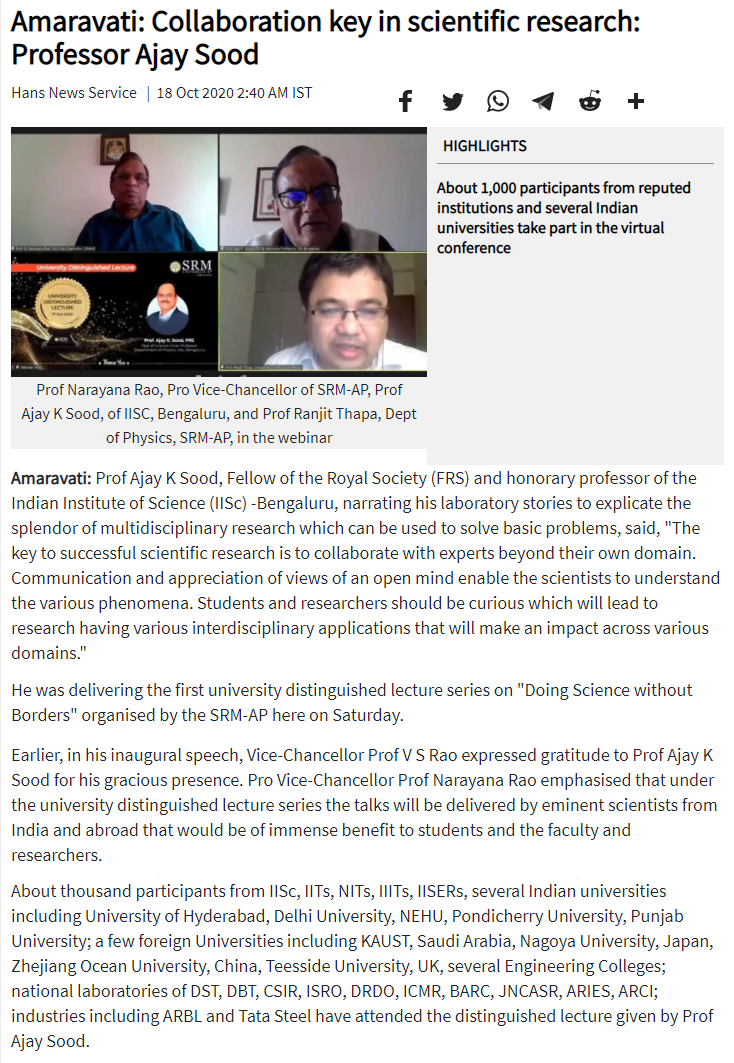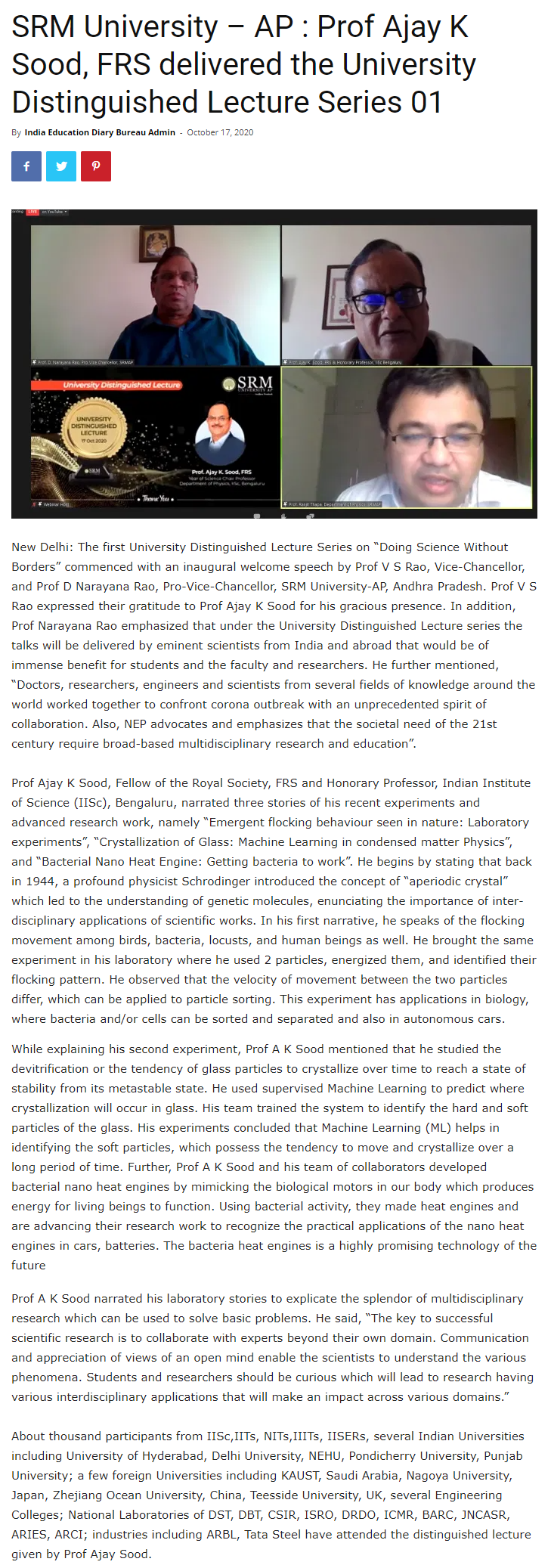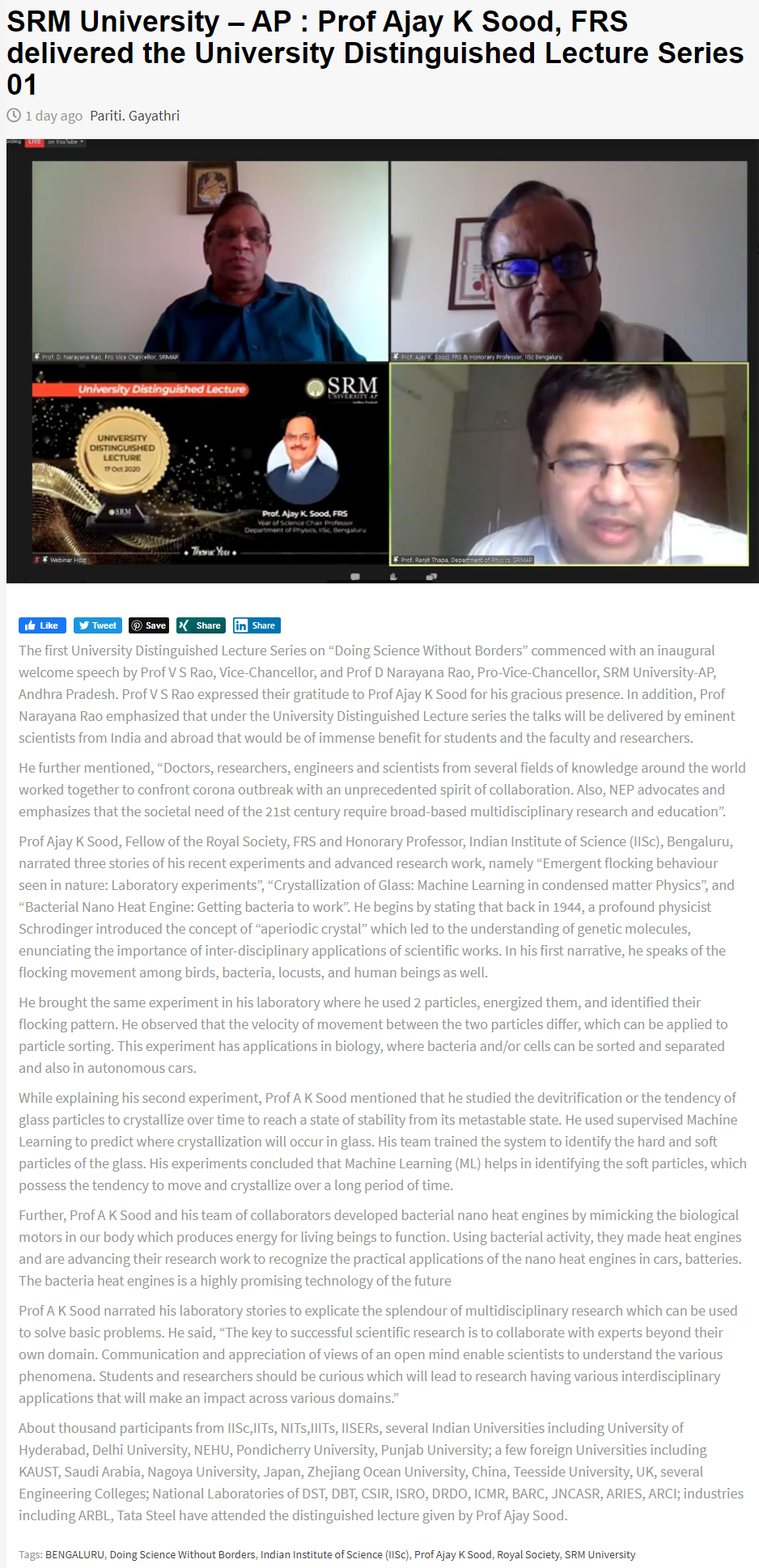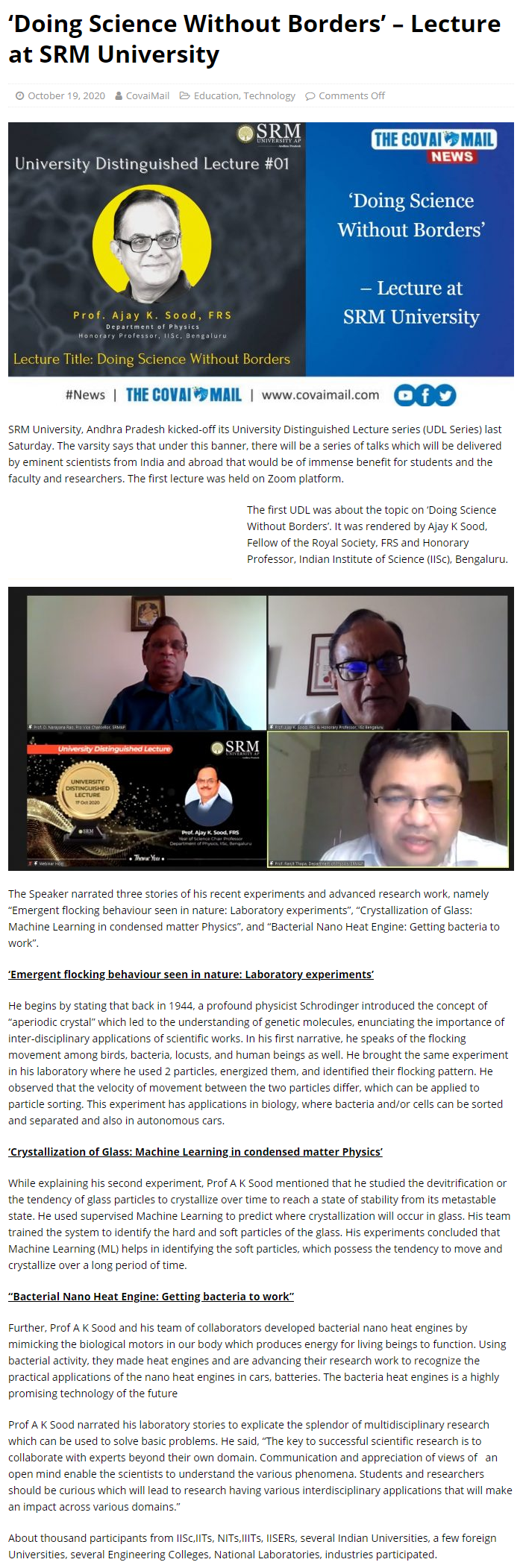All Management Events
- Faculty Development Programme (FDP) on “Recent Advancements in Machine Learning and Artificial Intelligence” October 21, 2020
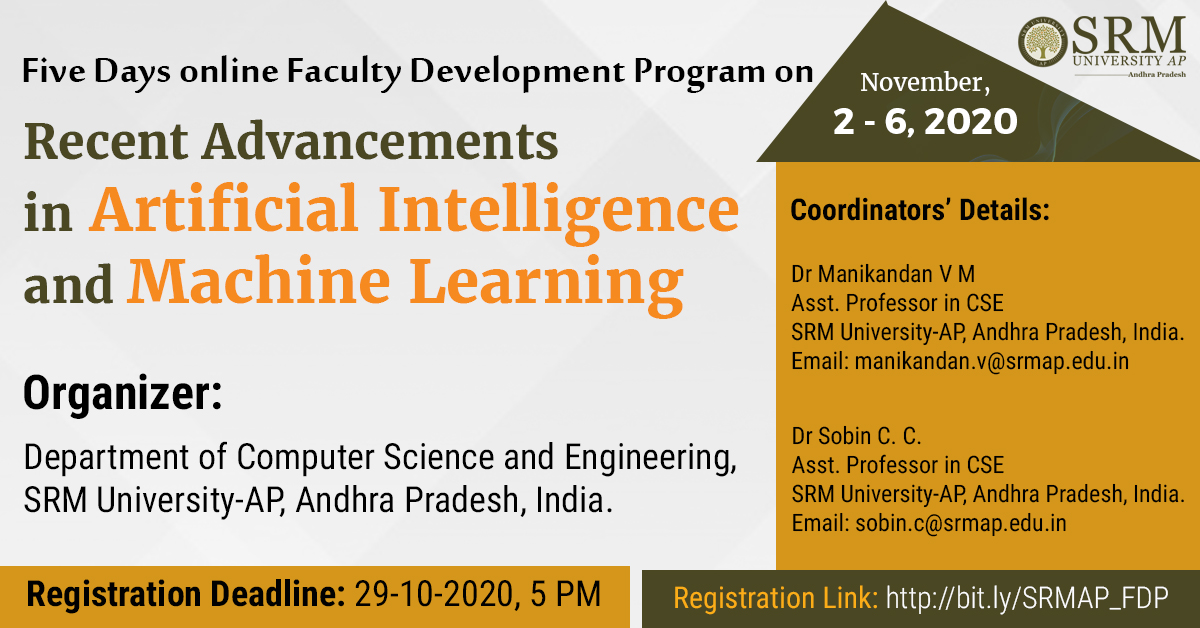 Department of Computer Science and Engineering, SRM University-AP, Andhra Pradesh is orchestrating a five-day online Faculty Development Programme (FDP) on “Recent Advancements in Machine Learning and Artificial Intelligence” from November 2, 2020, till November 6, 2020. The programme will be split into two sessions, where the first session will be held from 9.30 AM to 11 AM, and the second session will commence at 11.30 AM and end at 1 PM. During the FDP, Resource persons will be sharing knowledge during the morning sessions of the FDP to inspire, and mentor the faculty. Among the venerated speakers, Prof Dipti Prasad Mukharjee, Professor, Electronics and Communication Sciences Unit, ISI Kolkata, India will be delivering a lecture on “Machine Learning Techniques for Computer Vision”. Further, Dr V Masilamani, Associate Professor, Computer Engineering, Indian Institute of Information Technology Design and Manufacturing (IIITDM) Kancheepuram, Tamil Nadu, India, will be sharing insights on “Machine Learning for Image Quality Assessment”.
Department of Computer Science and Engineering, SRM University-AP, Andhra Pradesh is orchestrating a five-day online Faculty Development Programme (FDP) on “Recent Advancements in Machine Learning and Artificial Intelligence” from November 2, 2020, till November 6, 2020. The programme will be split into two sessions, where the first session will be held from 9.30 AM to 11 AM, and the second session will commence at 11.30 AM and end at 1 PM. During the FDP, Resource persons will be sharing knowledge during the morning sessions of the FDP to inspire, and mentor the faculty. Among the venerated speakers, Prof Dipti Prasad Mukharjee, Professor, Electronics and Communication Sciences Unit, ISI Kolkata, India will be delivering a lecture on “Machine Learning Techniques for Computer Vision”. Further, Dr V Masilamani, Associate Professor, Computer Engineering, Indian Institute of Information Technology Design and Manufacturing (IIITDM) Kancheepuram, Tamil Nadu, India, will be sharing insights on “Machine Learning for Image Quality Assessment”.Moving ahead with the FDP, Dr Deepak Mishra, Associate Professor & Head, Avionics Department Indian Institute of Space Technology (IIST), Trivandrum, Kerala, India, will host a session on “Machine Learning Applications in Remote Sensing”. Another session will be held on “Object and Image Memorability Analysis using Deep Learning Approach” by Dr Arjit Sur, Associate Professor, Computer Science and Engineering, IIT Guwahati, India. In addition, Dr A Vadivel, Associate Professor, Computer Science and Engineering, SRM University-AP, Andhra Pradesh, has been requested to conduct a session on “India Facial Expression Classification Using Machine Learning”. Apart from this, Dr Amal Dev P, Assistant Professor, Computer Science and Engineering, IIT Guwahati, India will be discussing the “Applications of AI in Computer Graphics”.
Dr Deepak Ranjan Nayak, Assistant Professor, Computer Engineering, MNIT Jaipur, Rajasthan, India, will be speaking on “Medical Image Processing using Deep Learning” whereas, Dr Sanjay Kumar Panda, Assistant Professor, Computer Science and Engineering, NIT Warangal, Telangana, India have chosen the topic “Case Study of Machine Learning: Recommender Systems” for his lecture during the FDP. Also, the department of CSE will be welcoming Dr Subhankar Mishra, Assistant Professor, Computer Science, National Institute of Science Education and Research (NISER), Bhubaneswar, India, and Dr Jatindra Dash, Assistant Professor, Computer Science and Engineering, SRM University-AP, Andhra Pradesh, India, to deliver a talk on “Secure and Private Machine Learning”, and “Texture Classification using Machine Learning”, respectively. Post graduate and research students, along with faculty across various institutions with background knowledge in Computer Science and/or Electronics Engineering are urged to attend the FDP to augment their horizon of knowledge, and receive an e-certificate on successfully completing the entire five-day FDP.
Registration Link: Please Click Here
Brochure: Please Click Here
Coordinators’ Details:
Dr Manikandan V M
Assistant Professor, Department of Computer Science and Engineering
EMAIL: manikandan.v@srmap.edu.inDr Sobin C C
Continue reading →
Assistant Professor, Department of Computer Science and Engineering
EMAIL: sobin.c@srmap.edu.in - UDL 01: Prof Ajay K Sood on “Doing Science Without Borders” October 20, 2020
The Hans India – Oct 18
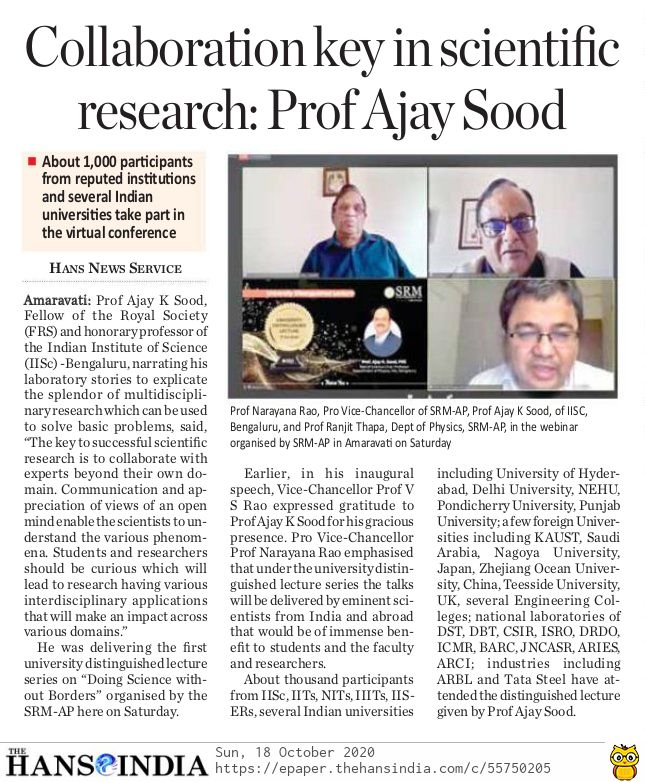
Higher Education Plus – Oct 19

Business News This Week – Oct 19
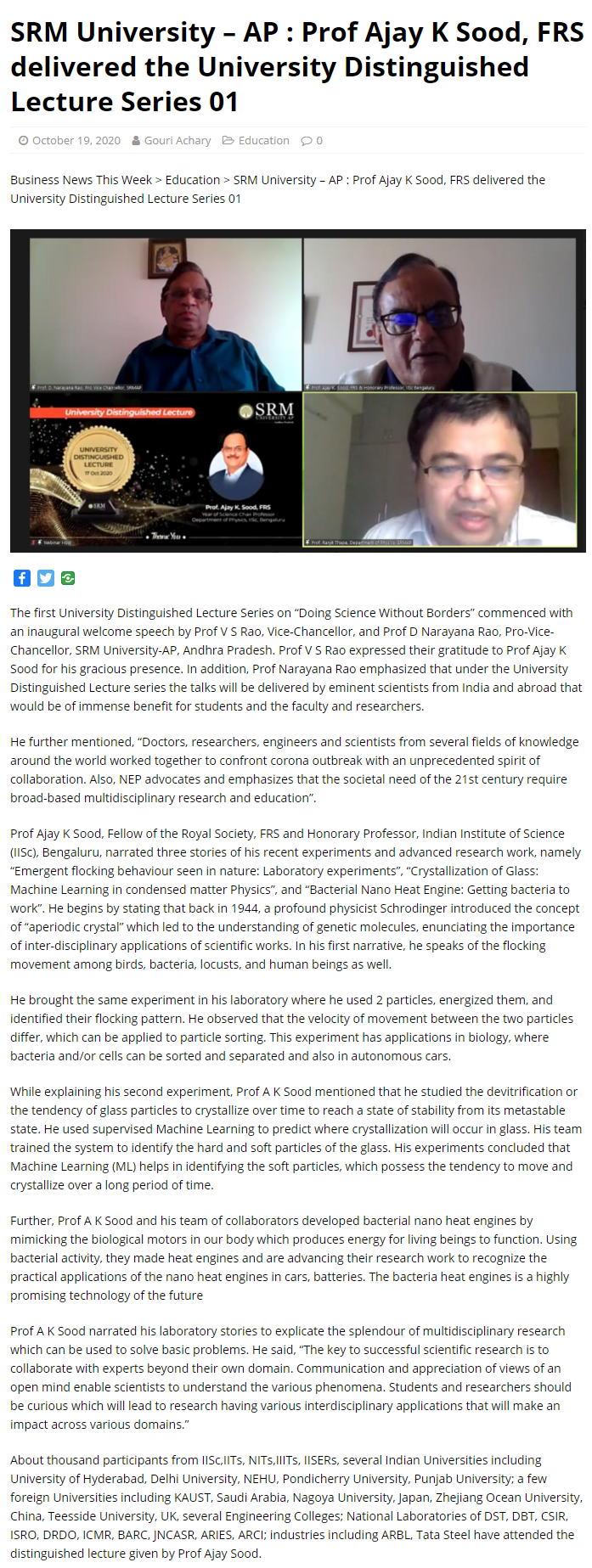
Eenadu – Oct 19

Andhra Prabha – Oct 19
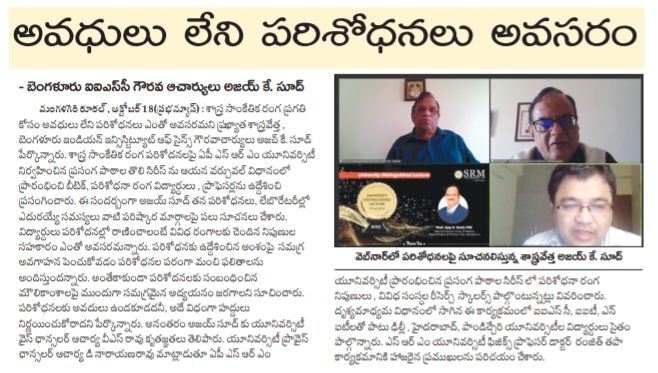
Vartha – Oct 19
Continue reading →

- Prof Ajay K Sood, FRS delivered the University Distinguished Lecture 01 October 19, 2020
Prof A K Sood on “Doing Science Without Borders”: Collaboration and curiosity among researchers will lead to impactful multidisciplinary solutions of the 21st century
 The first University Distinguished Lecture on “Doing Science Without Borders” commenced with an inaugural welcome speech by Prof V S Rao, Vice-Chancellor, and Prof D Narayana Rao, Pro-Vice-Chancellor, SRM University-AP, Andhra Pradesh. Prof V S Rao expressed their gratitude to Prof Ajay K Sood for his gracious presence. Prof Narayana Rao emphasized that under the University Distinguished Lecture series, the talks will be delivered by eminent scientists from India and abroad that would be of immense benefit for students and the faculty and researchers. He further mentioned, “Doctors, researchers, engineers and scientists from several fields of knowledge around the world worked together to confront corona outbreak with an unprecedented spirit of collaboration. Also, NEP advocates and emphasizes that the societal need of the 21st century require broad-based multidisciplinary research and education”.
The first University Distinguished Lecture on “Doing Science Without Borders” commenced with an inaugural welcome speech by Prof V S Rao, Vice-Chancellor, and Prof D Narayana Rao, Pro-Vice-Chancellor, SRM University-AP, Andhra Pradesh. Prof V S Rao expressed their gratitude to Prof Ajay K Sood for his gracious presence. Prof Narayana Rao emphasized that under the University Distinguished Lecture series, the talks will be delivered by eminent scientists from India and abroad that would be of immense benefit for students and the faculty and researchers. He further mentioned, “Doctors, researchers, engineers and scientists from several fields of knowledge around the world worked together to confront corona outbreak with an unprecedented spirit of collaboration. Also, NEP advocates and emphasizes that the societal need of the 21st century require broad-based multidisciplinary research and education”.Prof Ajay K Sood, Fellow of the Royal Society, FRS and Honorary Professor, Indian Institute of Science (IISc), Bengaluru, narrated three stories of his recent experiments and advanced research work, namely “Emergent flocking behaviour seen in nature: Laboratory experiments”, “Crystallization of Glass: Machine Learning in condensed matter Physics”, and “Bacterial Nano Heat Engine: Getting bacteria to work”. He begins by stating that back in 1944, a profound physicist Schrodinger introduced the concept of “aperiodic crystal” which led to the understanding of genetic molecules, enunciating the importance of inter-disciplinary applications of scientific works. In his first narrative, he speaks of the flocking movement among birds, bacteria, locusts, and human beings as well. He brought the same experiment in his laboratory where he used 2 particles, energized them, and identified their flocking pattern. He observed that the velocity of movement between the two particles differ, which can be applied to particle sorting. This experiment has applications in biology, where bacteria and/or cells can be sorted and separated and also in autonomous cars.
While explaining his second experiment, Prof A K Sood mentioned that he studied the devitrification or the tendency of glass particles to crystallize over time to reach a state of stability from its metastable state. He used supervised Machine Learning to predict where crystallization will occur in glass. His team trained the system to identify the hard and soft particles of the glass. His experiments concluded that Machine Learning (ML) helps in identifying the soft particles, which possess the tendency to move and crystallize over a long period of time. Further, Prof A K Sood and his team of collaborators developed bacterial nano heat engines by mimicking the biological motors in our body which produces energy for living beings to function. Using bacterial activity, they made heat engines and are advancing their research work to recognize the practical applications of the nano heat engines in cars, batteries. The bacteria heat engines is a highly promising technology of the future.
Prof A K Sood narrated his laboratory stories to explicate the splendor of multidisciplinary research which can be used to solve basic problems. He said, “The key to successful scientific research is to collaborate with experts beyond their own domain. Communication and appreciation of views of an open mind enable the scientists to understand the various phenomena. Students and researchers should be curious which will lead to research having various interdisciplinary applications that will make an impact across various domains.”
About thousand participants from IISc,IITs, NITs,IIITs, IISERs, several Indian Universities including University of Hyderabad, Delhi University, NEHU, Pondicherry University, Punjab University; a few foreign Universities including KAUST, Saudi Arabia, Nagoya University, Japan, Zhejiang Ocean University, China, Teesside University, UK, several Engineering Colleges; National Laboratories of DST, DBT, CSIR, ISRO, DRDO, ICMR, BARC, JNCASR, ARIES, ARCI; industries including ARBL, Tata Steel have attended the distinguished lecture given by Prof Ajay Sood.
Continue reading → - “The Trove Heist” presented by the Department of Student Affairs along with SRM AP ACM Student community October 17, 2020
Continue reading → The Department of Student Affairs, SRM University-AP, Andhra Pradesh, along with SRM University AP ACM Student community, brings an excellent opportunity for the students to spend a light-hearted time, filled with fun and excitement. The department is giving away prizes worth Rs. 3000 to the winners of “The Trove Heist”,which is organized on October 18, 2020, at 10 a.m. In this online treasure hunt, the best deals can be stolen by paving the way through amazing mazes, hurdles, and puzzles. Students are urged to hone their grey cells and outshine their peers to win prizes galore.
The Department of Student Affairs, SRM University-AP, Andhra Pradesh, along with SRM University AP ACM Student community, brings an excellent opportunity for the students to spend a light-hearted time, filled with fun and excitement. The department is giving away prizes worth Rs. 3000 to the winners of “The Trove Heist”,which is organized on October 18, 2020, at 10 a.m. In this online treasure hunt, the best deals can be stolen by paving the way through amazing mazes, hurdles, and puzzles. Students are urged to hone their grey cells and outshine their peers to win prizes galore. - “Transformation Process of a student to an employee & insights on resume building/digital interviews” by Mr Rakesh M S, HR, Capgemini October 16, 2020
Continue reading →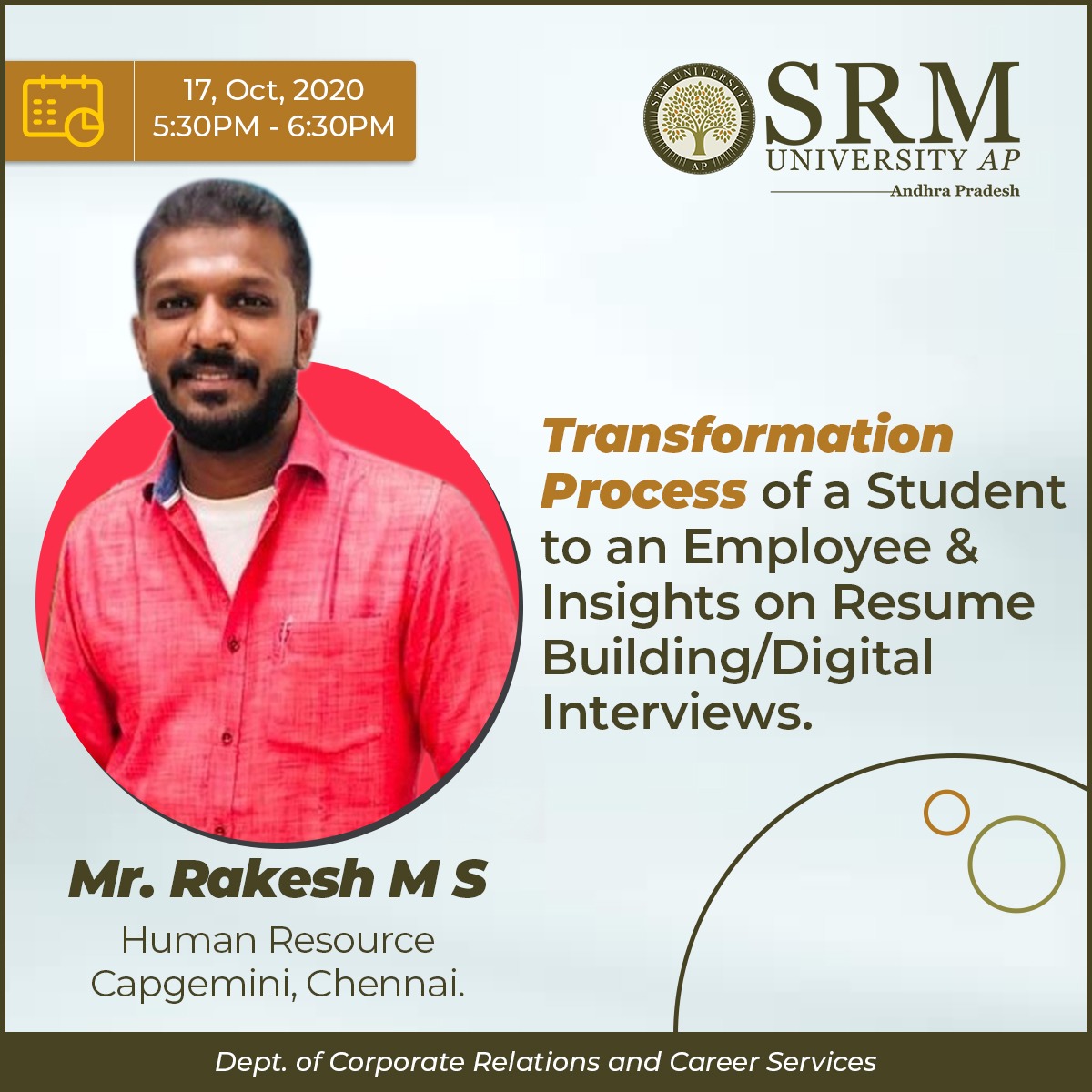 Department of Corporate Relations & Career Services, SRM university-AP, Andhra Pradesh is presenting a webinar on “Transformation Process of a student to an employee & insights on resume building/digital interviews”. On October 17, 2020, at 5.30 p.m., Mr Rakesh M S, Human Resource, Capgemini, Chennai, will be addressing the students of SRM AP. He holds more than 9 years of experience in Human Resource Management, where he handles and leads HR functions such as HR Operations & Business HR Partner role, along with leading the Fresher’s Batch Management. He has been invited as Guest Lecturer in several Engineering Colleges to provide insights on the transition state of students to employees. His sessions encompass the current scenario, the gaps, the ways to bridge the gaps, the challenges, and do’s & don’ts crucial to the students. Students are recommended to attend the session with Mr Rakesh M S, who will draw practical, in-depth, ground-level examples to decipher the stages of transition. He will also be sharing significant information on resume building and digital interviews, which will help the students to excel in the recruitment drive and grab their dream job offer.
Department of Corporate Relations & Career Services, SRM university-AP, Andhra Pradesh is presenting a webinar on “Transformation Process of a student to an employee & insights on resume building/digital interviews”. On October 17, 2020, at 5.30 p.m., Mr Rakesh M S, Human Resource, Capgemini, Chennai, will be addressing the students of SRM AP. He holds more than 9 years of experience in Human Resource Management, where he handles and leads HR functions such as HR Operations & Business HR Partner role, along with leading the Fresher’s Batch Management. He has been invited as Guest Lecturer in several Engineering Colleges to provide insights on the transition state of students to employees. His sessions encompass the current scenario, the gaps, the ways to bridge the gaps, the challenges, and do’s & don’ts crucial to the students. Students are recommended to attend the session with Mr Rakesh M S, who will draw practical, in-depth, ground-level examples to decipher the stages of transition. He will also be sharing significant information on resume building and digital interviews, which will help the students to excel in the recruitment drive and grab their dream job offer. - University Distinguished Lecture Series 01: Prof Ajay K Sood on “Doing Science Without Borders” October 14, 2020
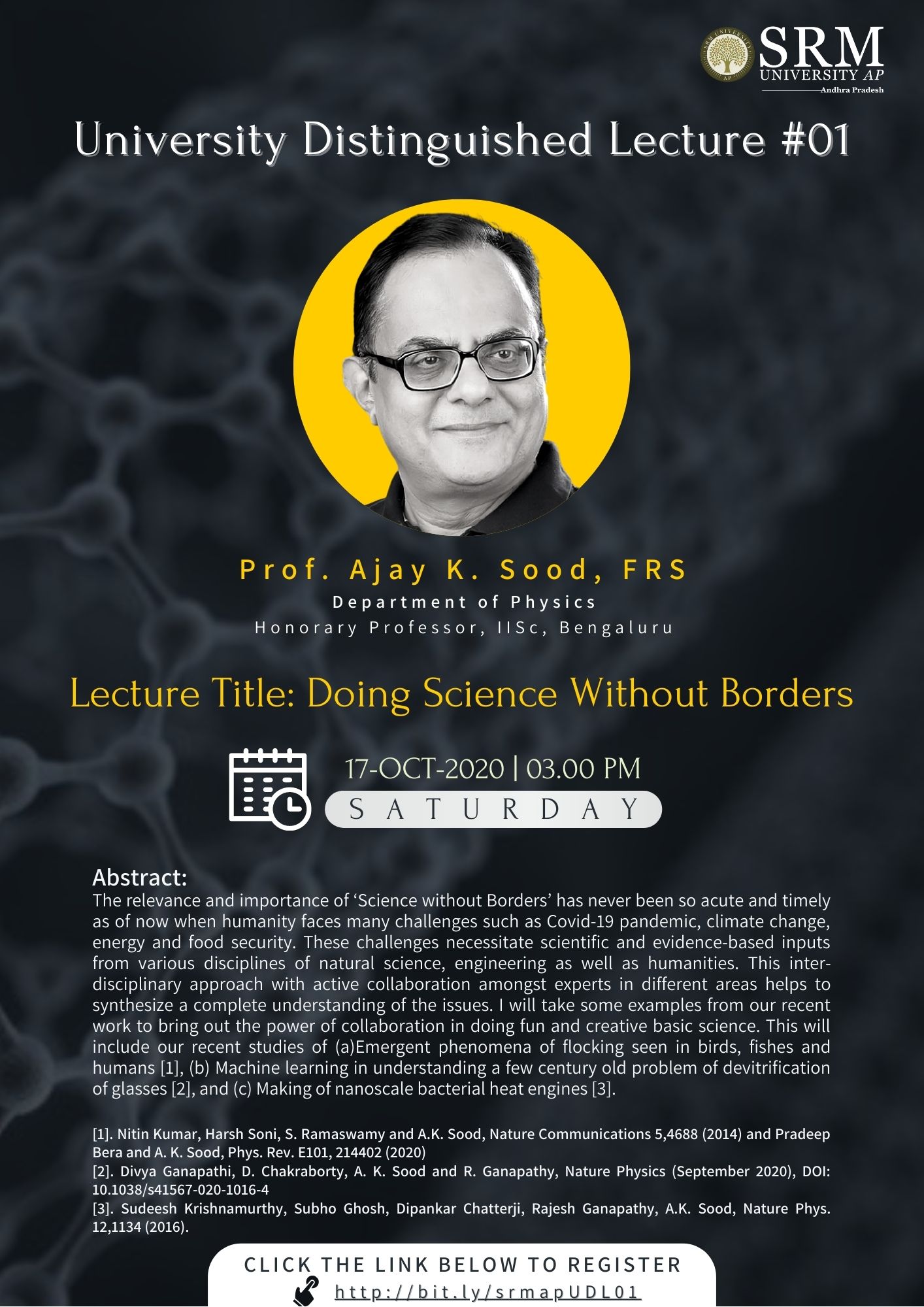 SRM University-AP, Andhra Pradesh is organizing University Distinguished Lecture Series. The first edition of the series is arranged on October 17, 2020, at 3 p.m., where Prof Ajay K Sood, Fellow of the Royal Society, FRS and Honorary Professor, Indian Institute of Science (IISc), Bengaluru, will be delivering a lecture on “Doing Science Without Borders”. In the recent times, humanity is facing several challenges such as the Covid-19 pandemic, climate change, and energy and food crises. Scientific and evidence-based inputs from various disciplines of natural science, engineering, as well as humanities is essential for the world to thrive.
SRM University-AP, Andhra Pradesh is organizing University Distinguished Lecture Series. The first edition of the series is arranged on October 17, 2020, at 3 p.m., where Prof Ajay K Sood, Fellow of the Royal Society, FRS and Honorary Professor, Indian Institute of Science (IISc), Bengaluru, will be delivering a lecture on “Doing Science Without Borders”. In the recent times, humanity is facing several challenges such as the Covid-19 pandemic, climate change, and energy and food crises. Scientific and evidence-based inputs from various disciplines of natural science, engineering, as well as humanities is essential for the world to thrive. This inter-disciplinary approach with active collaboration amongst experts across different spheres will assist in synthesizing a complete understanding of the issues. Prof Ajay K Sood will speak on his recent works such as “Emergent phenomena of flocking seen in birds, fishes and humans”, “Machine learning in understanding a few century-old problem of devitrification of glasses”, and “Making of nanoscale bacterial heat engines”. Drawing examples from his aforementioned works, Prof Ajay K Sood will narrate the power of collaboration in doing creative basic science.
Registration Link: https://bit.ly/srmapUDL01 (Registration Closed)
Continue reading → - SRM AP in collaboration with IIT, Chicago presents webinar on “Education Opportunities at Illinois Institute of Technology, Chicago, USA” October 13, 2020
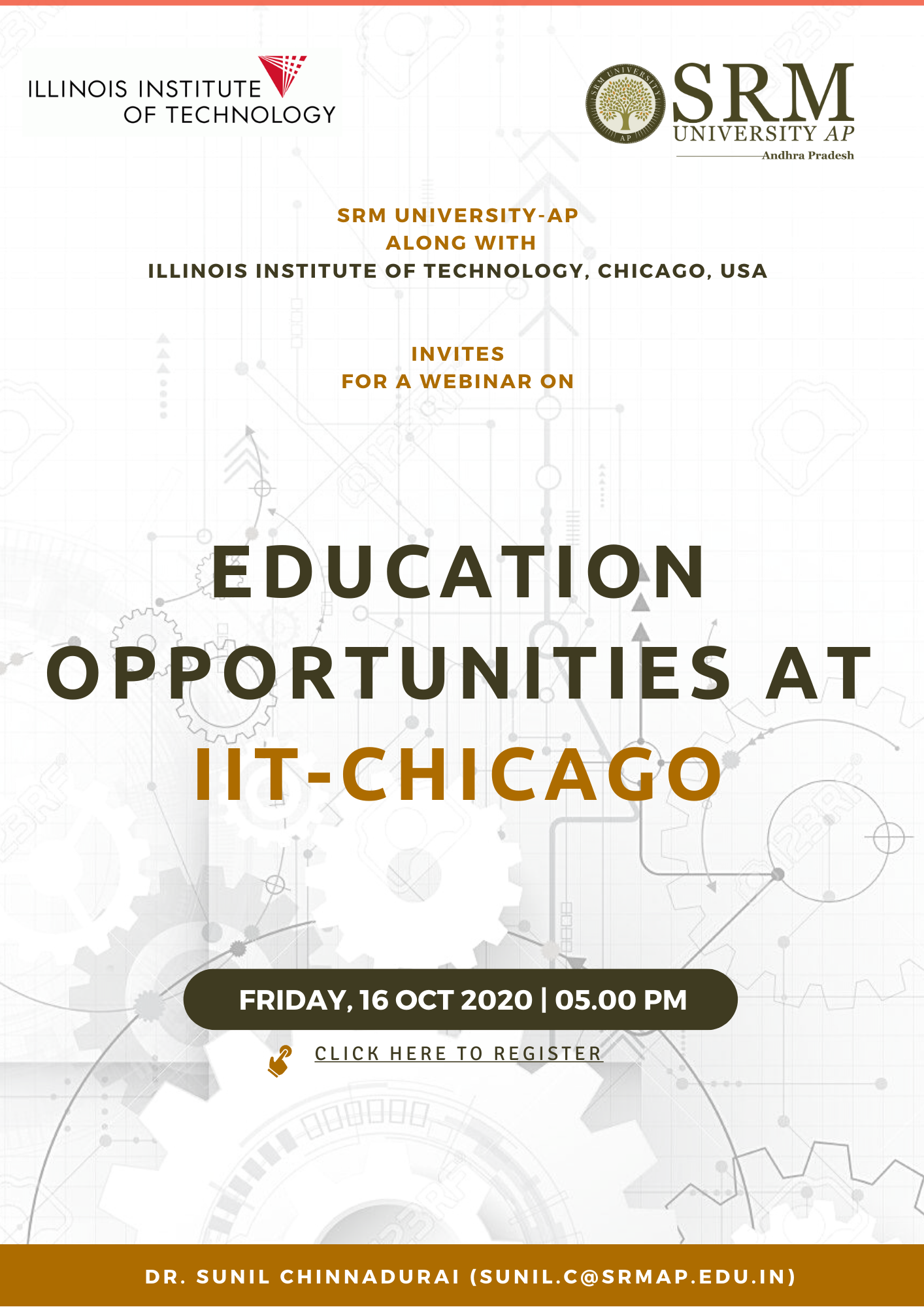 SRM University-AP, Andhra Pradesh along with Illinois Institute of Technology, Chicago, USA, is delighted to organize a webinar on “Education Opportunities at Illinois Institute of Technology, Chicago, USA”. The session will provide insights on the Twinning programme ideal for the current first and second year students, along with the Integrated Master’s programme that would be beneficial for the current third and final year students. Students are encouraged to participate in the webinar on October 16, 2020 at 5 p.m. for obtaining further information on the programmes, benefits of the programmes, and application process.
SRM University-AP, Andhra Pradesh along with Illinois Institute of Technology, Chicago, USA, is delighted to organize a webinar on “Education Opportunities at Illinois Institute of Technology, Chicago, USA”. The session will provide insights on the Twinning programme ideal for the current first and second year students, along with the Integrated Master’s programme that would be beneficial for the current third and final year students. Students are encouraged to participate in the webinar on October 16, 2020 at 5 p.m. for obtaining further information on the programmes, benefits of the programmes, and application process. Registration Link: Please Click Here
For further details, Contact Dr. Sunil Chinnadurai
Continue reading → - DST, Government of India sanctions an outlay of Rs.14.63 lakhs to Dr Tapan Kumar Hota October 13, 2020
Connecting the dots between Mathematics and Physics of the hydrodynamic instability known as Viscous Fingering (VF)
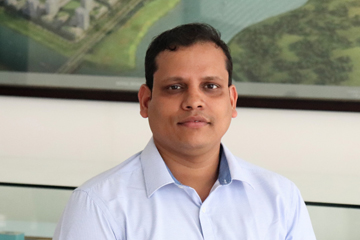
DST, Government of India, sanctioned a total outlay of Rs.14.63 lakhs to Dr Tapan Kumar Hota, Assistant Professor, Department of Mathematics, SRM University-AP, Andhra Pradesh, for pursuing research on “Mathematical analysis and Adjoint Based Stability for a Coupled Convection-Diffusion equation in Miscible Displacement”. Hydrodynamic Stability (Instability) is a study of an equilibrium point subject to small and/or medium disturbances. This assists in understanding several complicated natural phenomena such as fluid transition from laminar to turbulent, chemical mixing, formation of cloud, and others. The available stability analysis is unable to address the early-time evolution of the VF process. The early-time behaviour of the system helps us to choose the parameters that are responsible for the long-time behaviour of the coupled PDEs. To achieve the target, we need to address the linear stability of the system from the study of the singular-value-decomposition instead of traditional eigenvalue analysis. As the system is non-autonomous, the eigenvectors/eigenvalues may not be physically relevant. Further, it is required to confirm our linear stability analysis by mathematical analysis of the coupled non-linear PDEs.
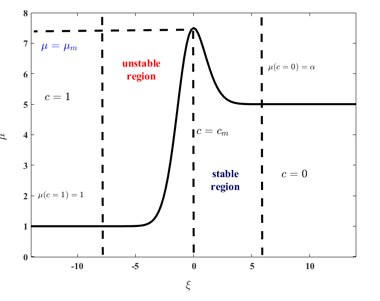

‘The nonmonotonic viscosity profile when a high mobile fluid is displacing a less mobile fluid. There is a potentially unstable region, where the viscosity increases in the flow direction, followed in the downstream direction by a potentially stable region, where the viscosity decreases in the flow direction. The disturbance structure is computed using the singular-value decomposition of the propagator matrix. Reference: Hota & Mishra, Journal of Fluid Mech, Vol. 856, pp:552-579, 2018.’
Dr Tapan is keen on studying other branches of science to provide the correct mathematical approach to address the issues. His project will address one of the hydrodynamic instabilities known as viscous fingering (VF). It forms when a high mobile fluid displaces a low mobile fluid. It has enormous implications in the field of Chemical Engineering Science, Petroleum Engineering, Chromatography, and Oil Extraction process. He explains, “I will study this instability from a mathematician’s point of view, more precisely, to address the mathematical analysis of coupled partial differential equations (PDEs). The system that governs the VF is non-autonomous and there is no readily available stability analysis that can represent Physics, based on robust mathematical analysis. My aim is to connect the dots between mathematics and physics of the VF.”
Infrastructure and laboratory facilities are crucial to conduct research. Upon receiving approval from a prestigious organization like SERB (Science and Engineering Research Board), Govt. of India, Dr. Tapan is entitled to this unique opportunity to serve the scientific community. He divulges, “The award is not only a recognition to me but also to the SRM University, AP. The University will be more visible in the world of research and can attract more eminent scientists and researchers to make the University their second home.” Quoting Master Oogway, ‘Yesterday is history, Tomorrow is a mystery… Today is a gift, that’s why it is called present.’, Dr Tapan is eager to commence working on his project at the earliest, and looks forward to enjoying the process of accomplishing the task.
Continue reading → - Dr Writoban Basu Ball receives an outlay of Rs. 26.34 lakhs from DST, Government of India October 13, 2020
Pursuit of discovering new drug molecules to combat diseases
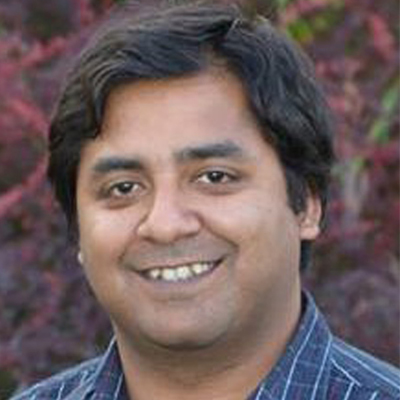
Dr Writoban Basu Ball, Assistant Professor, Department of Biological Sciences, received an outlay of Rs.26.34 lakhs from DBT, Government of India to pursue research on “Targeting Kennedy pathway of cellular phosphatidylethanolamine biosynthesis as a common therapeutic strategy against protozoan parasites like Leishmania donovani, Trypanosoma brucei and Entamoeba histolytica.” Disease-causing intracellular parasites present serious health challenges, which could be fatal if left untreated. For example, Leishmania donovani and Trypanosoma brucei are the causative agents of visceral leishmaniasis and sleeping sickness, respectively. Entamoeba histolytica causes amoebiasis and 100,000 people die each year world-wide from amoebiasis-related complications. The current treatment regimen against these diseases consists of drugs that possess severe toxicity and drug resistance. Toxicity is detrimental to health and drug-resistance causes unresponsiveness of the drug to the parasite, rendering the drug ineffective. Therefore, it has become imperative to discover new drug molecules to combat these diseases.
 In his study, Dr Writoban proposes to repurpose an FDA-approved drug meclizine, which can be used as a potential drug against dreadful parasitic infections. He explains. “One rational way to discover new and effective drugs entails identifying pharmacological targets against unique yet essential parasite metabolic pathways which are either absent or redundant in hosts (in the present case humans). One such central metabolic pathway in L. donovani, T. brucei, and E. histolytica is the Kennedy pathway for the biosynthesis of phosphatidylethanolamine (PE), a major lipid molecule of the cell. Without the presence of this lipid molecule, the cellular membranes (plasma membrane, organellar membranes) cannot form. Therefore, the Kennedy pathway is indispensable to parasite survival. On the contrary, in humans, although the Kennedy pathway is present, other pathway of PE biosynthesis is predominant. Hence, the Kennedy pathway offers a potential target to disrupt PE biosynthesis in these parasites without causing any side effects in the human host. In this context, meclizine, an over the counter anti-nausea drug, has been shown to disrupt the Kennedy pathway.”
In his study, Dr Writoban proposes to repurpose an FDA-approved drug meclizine, which can be used as a potential drug against dreadful parasitic infections. He explains. “One rational way to discover new and effective drugs entails identifying pharmacological targets against unique yet essential parasite metabolic pathways which are either absent or redundant in hosts (in the present case humans). One such central metabolic pathway in L. donovani, T. brucei, and E. histolytica is the Kennedy pathway for the biosynthesis of phosphatidylethanolamine (PE), a major lipid molecule of the cell. Without the presence of this lipid molecule, the cellular membranes (plasma membrane, organellar membranes) cannot form. Therefore, the Kennedy pathway is indispensable to parasite survival. On the contrary, in humans, although the Kennedy pathway is present, other pathway of PE biosynthesis is predominant. Hence, the Kennedy pathway offers a potential target to disrupt PE biosynthesis in these parasites without causing any side effects in the human host. In this context, meclizine, an over the counter anti-nausea drug, has been shown to disrupt the Kennedy pathway.”Dr Writoban’s research is oriented to find safe cures for dreadful parasitic diseases that mostly plagues the underprivileged section of the developing countries like India, and countries of the sub-Saharan Africa. He believes, “The successful implementation of the proposed research scheme would benefit a lot of underprivileged people belonging to the underdeveloped and developing countries, as well as reduce the disease burden of those countries.” Further, Dr Writoban emphasizes, “Getting the grant is only the job half done. I would like to guide this proposal to a fruitful completion so that it can benefit people who need it most. I really want to take this project beyond the bounds of a mere academic exercise.
Continue reading → - Natyaswara- an inter-college dancing and singing competition on the eve of Navratri October 11, 2020
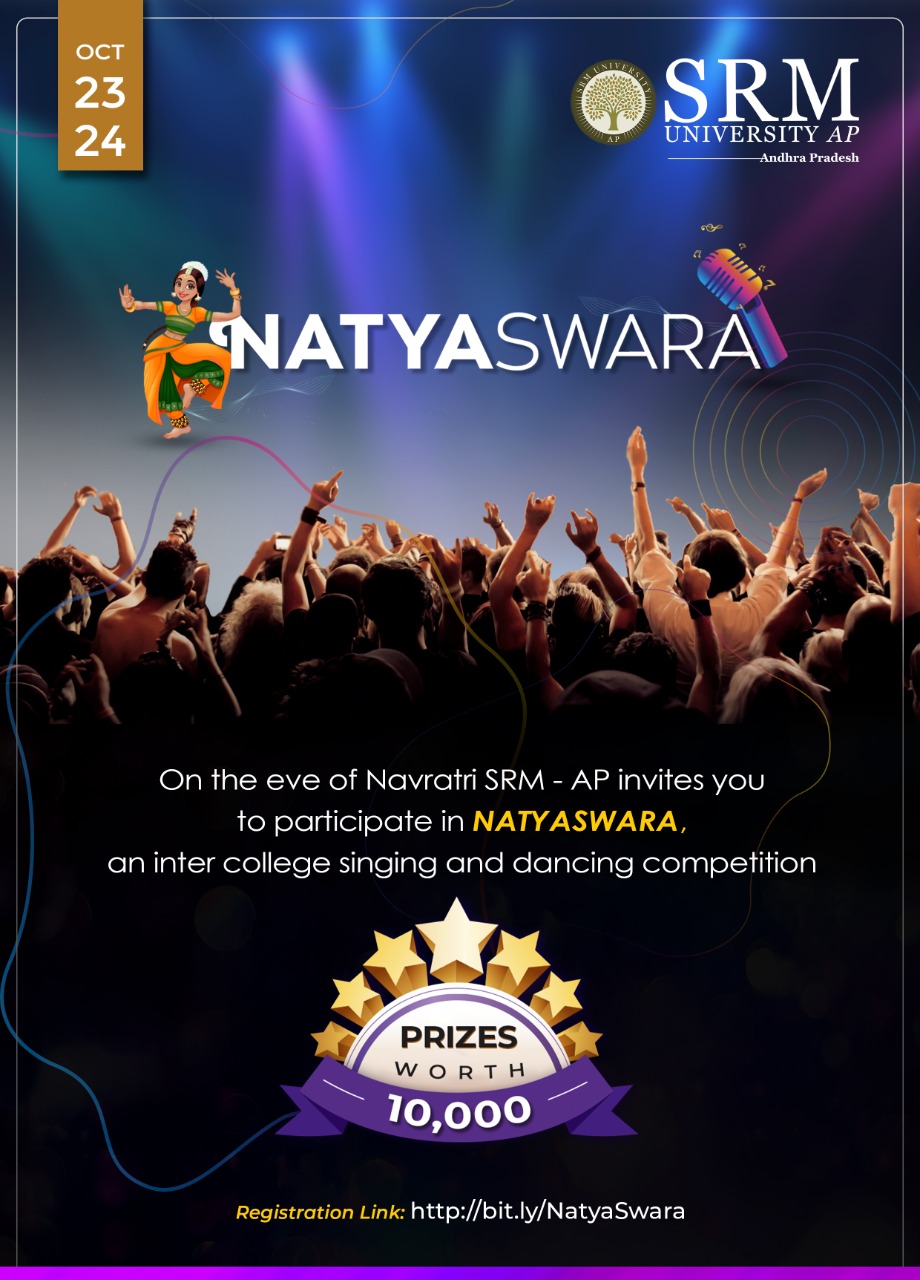 Navratri is around the corner, and the Department of Student Affairs, SRM University-AP, Andhra Pradesh is initiating Natyaswara on October 23-24, 2020. Marking the beginning of the auspicious occasion, and to uphold the spirit of festivities, the inter-college dancing and singing competition will enable the students to rejoice. Students are implored to participate in the competition, and showcase their skills in this traditional art form to win the prizes worth Rs. 10000 (Dancing: 1st Prize- Rs. 2000; 2nd Prize- Rs. 1500; 1st consolation prize- Rs. 500; 2nd consolation prize- Rs. 500; 3rd consolation prize: Rs. 500 & Singing: 1st Prize- Rs. 2000; 2nd Prize- Rs. 1500; 1st consolation prize- Rs. 500; 2nd consolation prize- Rs. 500; 3rd consolation prize: Rs. 500).
Navratri is around the corner, and the Department of Student Affairs, SRM University-AP, Andhra Pradesh is initiating Natyaswara on October 23-24, 2020. Marking the beginning of the auspicious occasion, and to uphold the spirit of festivities, the inter-college dancing and singing competition will enable the students to rejoice. Students are implored to participate in the competition, and showcase their skills in this traditional art form to win the prizes worth Rs. 10000 (Dancing: 1st Prize- Rs. 2000; 2nd Prize- Rs. 1500; 1st consolation prize- Rs. 500; 2nd consolation prize- Rs. 500; 3rd consolation prize: Rs. 500 & Singing: 1st Prize- Rs. 2000; 2nd Prize- Rs. 1500; 1st consolation prize- Rs. 500; 2nd consolation prize- Rs. 500; 3rd consolation prize: Rs. 500).Upload your videos here to participate: Please Click Here
Last date to upload the videos – 22/10/2020
Continue reading →


